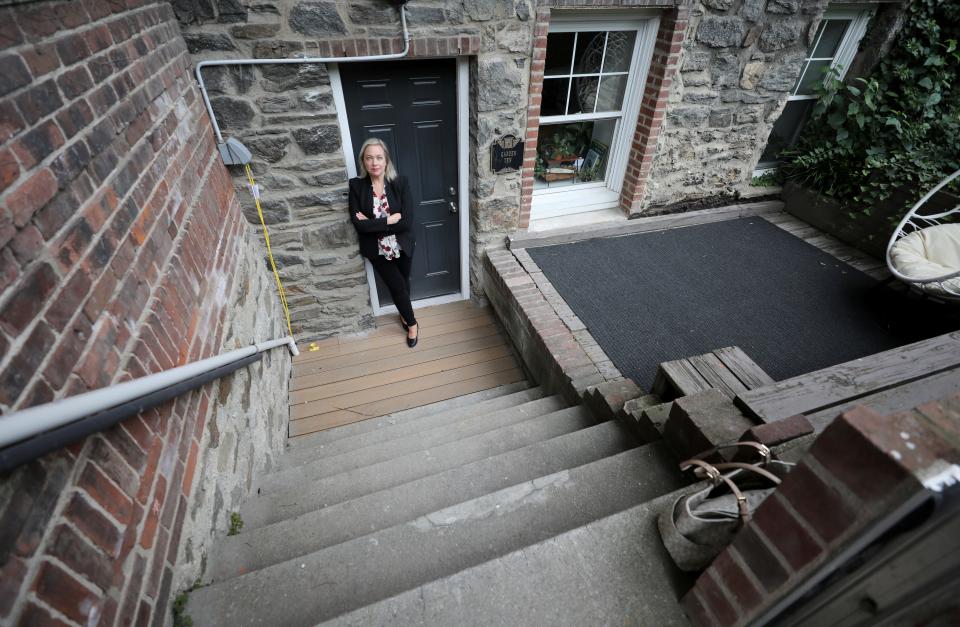Westchester's new flood history disclosure law is in effect. What to know
A Mamaroneck forum Thursday outlined a new Westchester County law meant to help tenants understand a property's history of flooding before they rent it.
The new measure requires landlords to disclose flood history of their properties before tenants sign a lease, and it also gives renters legal recourse if previous damage isn’t disclosed.
Thursday’s forum, hosted by the Mamaroneck-based nonprofit Community Resource Center, included county Legislator Catherine Parker, the author of the law, and Village Manager Jerry Barberio, who oversees a Long Island Sound Shore community that is frequently prone to flooding.
"It's giving us the power of choice," said Jirandy Martinez, the executive director of the Community Resource Center, which is based in the village's Flats neighborhood that saw extreme flooding when the remnants of Hurricane Ida hit the neighborhood in September 2021. The nonprofit's office is still closed.

Even after Ida, she added, families have been moving to the flood-prone neighborhood, formally known as Washingtonville, which has been a settling point for immigrant and working-class communities. They might not know about the area's history.
"It looks so beautiful and perfect," Martinez said. "You would never imagine that the community can receive up to 14 feet of water," which the state Office of Storm Recovery has noted.
In 2021, Ida devastated Mamaroneck. Residents and officials have told the USA TODAY Network New York flooding in the Flats — long an issue in the neighborhood — is only getting worse.
'You gotta get out!'Hurricane Ida’s deluge nearly drowned him in his NY apartment. He can’t afford to leave.
'People need an option'New York tenants could soon find out if their homes have flood history. What to know
When and where was the forum?
More than 40 people attended the forum at Mamaroneck's St. Thomas Episcopal Church that was in Spanish, with English interpretation.
The village — particularly the Flats sitting at the confluence of the Sheldrake and Mamaroneck rivers — is prone to severe flooding. There’s an $88 million U.S. Army Corps of Engineers plan years in the making that would mitigate flood risks in the area.
Many of those most affected were lower income, people of color and people with limited English proficiency, the state storm recovery office plan said.
Climate change is expected to fuel more Ida-like events, which could put more properties and tenants at risk.
In August, the state released its $41 million post-Ida recovery plan, with most funds going to Westchester.
Its focused on low and moderate-income communities, as well as small businesses, that saw the worst of flooding and were left out of disaster recovery efforts. The plan includes grants for relocating renters from homes damaged by Ida's floods, home repairs and support for agencies managing infrastructure resiliency.
Green energy concernsNY created an agency to OK wind and solar projects quickly. Upstate towns aren't happy
What does the new law do?
As of Aug. 15, the county law mandates that property owners disclose the flood history of particular building to prospective residential or commercial renters. Landlords will do so through a Department of Planning form that details whether the property is in a Federal Emergency Management Agency-designated flood hazard area, and if it has flooded within the last decade.
If landlords fail to provide a form, the law allows tenants to take landlords to court for damages incurred due to flooding.
How is it applied?

Property owners have to provide prospective tenants with the county’s Flood History Disclosure Form, which is prepared by the Department of Planning, before the parties sign a lease. It’s available in English and Spanish.
What has N.Y., U.S. done about flood history disclosure?
New York state requires little flood history disclosure, whereas there is a patchwork of laws in a handful of other states, according to the Natural Resources Defense Council, a nonprofit environmental advocacy group. The NRDC tracks laws on flood history across the U.S.
New York only requires property sellers to disclose if properties sit within a floodplain, and whether flooding produced standing water on a property. However, sellers can avoid this by paying a $500 fee.
Assemblymember Robert Carroll, D-Brooklyn, sponsored a bill that would make New Yorkers aware of flood risks to apartments before renting them. The bill passed both houses of the state Legislature earlier this year, and Gov. Kathy Hochul was set to review it, a spokesperson in her office said in July.
Where can I get more information?
In Mamaroneck, property owners can expect a flood history disclosure form in the mail with their tax bills in June, said Barberio, the village manager. He saw the forum as a way to introduce the new law to the community.
"This law exists, this requirement exists," he said. "It's something very important for people to know that a significant number of properties in the village flood."
Elsewhere, people can view the Department of Planning website to obtain a copy of the form, and to view more about the law. On Aug. 15, Deputy County Executive Ken Jenkins delivered a presentation on the law, which is available on Facebook.
The state storm recovery office plans to open applications for its $41 million fund in Spring 2023. The Community Resource Center is set to have forums on how to apply before the application opens.
Eduardo Cuevas covers race and justice for the USA TODAY Network of New York. He can be reached at EMCuevas1@gannett.com and followed on Twitter @eduardomcuevas.
This article originally appeared on New York State Team: Westchester's flood history disclosure law is in effect. What to know

